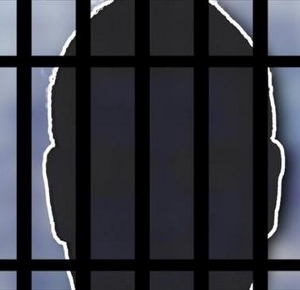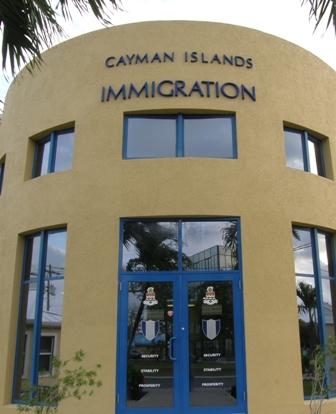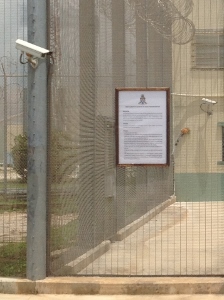Archive for September, 2013

Post office promises friendlier parcel service
 CNS): In an effort to reduce bureaucracy and offer a more customer-friendly checking procedure for parcels, the Cayman Islands Postal Service has begun checking packages as they arrive to assess duty levels before customers come to collect their parcels in the presence of postal service staff. The new system starts today (Monday 2 September), when parcels arriving through the Post Office will be processed and assessed based on the invoice or by examining the item if necessary, without the customer being present. As a result, officials said, the recipients will not, in most cases, be required to come into the Airport Post Office (APO) and wait in line to have a parcel assessed.
CNS): In an effort to reduce bureaucracy and offer a more customer-friendly checking procedure for parcels, the Cayman Islands Postal Service has begun checking packages as they arrive to assess duty levels before customers come to collect their parcels in the presence of postal service staff. The new system starts today (Monday 2 September), when parcels arriving through the Post Office will be processed and assessed based on the invoice or by examining the item if necessary, without the customer being present. As a result, officials said, the recipients will not, in most cases, be required to come into the Airport Post Office (APO) and wait in line to have a parcel assessed.
“It is similar to the process customs uses for assessing packages imported by Courier Services such as FedEx and DHL,” government officials said in a release. “Once the parcel is assessed, the duty information will then be entered in the parcel system, and a notice requesting the customer to come to the APO to collect the item will be generated. The notice will include the total amount due, including duty and fees.” CIPS officials did not, however, include instructions for customers on Cayman Brac or Little Cayman.
Customers on Grand Cayman will then be able to bring that notice to the post office, pay the stipulated amount and collect the parcel, which the officials said should significantly reduce the time customers normally have to wait to collect a parcel from the central post office.
In cases where an invoice has not been included in the package, customers can send it ahead of time via email to parcelpost@gov.ky to minimise delays. If a customer wishes to challenge or dispute the amount assessed, customs officers will still be available at the APO from 11:00am to 2.00pm to discuss the issue.
The customs department is open to the public from 8:30am to 4:00pm, Monday-Friday and Saturday 8:30am to 12:30pm.

Activist to host session on sex offenders
 (CNS): A local activist who has been advocating for a local sex offenders register, tougher and more consistent sentencing for those convicted and greater protection of children from sexual predators is hosting a presentation on the issue at the ICCI Wednesday evening. During the open session Sandra Catron will be discussing the sex offenders Facebook registry, which she created but which is now administered offshore, by Caymanians living overseas. Catron also recently began a petition to have the crown appeal a six month sentenced handed down to a local father who had molested his 8-year-old daughter over a two year period.
(CNS): A local activist who has been advocating for a local sex offenders register, tougher and more consistent sentencing for those convicted and greater protection of children from sexual predators is hosting a presentation on the issue at the ICCI Wednesday evening. During the open session Sandra Catron will be discussing the sex offenders Facebook registry, which she created but which is now administered offshore, by Caymanians living overseas. Catron also recently began a petition to have the crown appeal a six month sentenced handed down to a local father who had molested his 8-year-old daughter over a two year period.
The petition has received over 720 signatures and the Office of the Director of Public Prosecutions is now being appealed.
Catron, who is herself currently under police investigation as a result of her association with the register that is naming offenders, said the presentation will include valuable information about how to advocate on the issue, which has become particularly topical following a surge in sex offending cases coming before the courts and a series of successful convictions for the prosecution.
The session is planned for 7:30pm Wednesday at the International College of the Cayman Islands (ICCI), located on Hirst Road Newlands, in Friends Hall 2.
See open invitation below.
CNS is also soliciting opinions on this issue: See Naming sex offenders

Naming sex offenders
The call to name and shame convicted sex offenders, even when they have a family connection to their victims, has grown louder recently, but the argument that the reporting of such crimes should not lead the public to identify the victims, thus adding to their pain, certainly has merit. As a result, CNS is soliciting the opinion of victims, social workers, lawyers and other stakeholders about naming sex offenders after they have been found guilty of the crime.
The law does not prohibit naming offenders, only the publication of any information which could identify the victim. This means that when the offender is a father, step-father, grandparent, uncle (or, indeed, mother, step-mother, etc) or merely in a relationship with a family member, as is often the case in sex crimes the world over, in a small community like ours naming the offender could lead to many more people identifying the victim.
If in our reports we named the culprit but left out critical information (such as the relationship to the victim), this might offer some protection for the victim's identity. But what if other media houses reported on the relationship but not the name? The public would then be able to put the pieces of the jigsaw together and the victim’s identity would be known.
The naming of offenders for any other crime is part and parcel of the public’s right to know in a transparent and democratic society, where all court proceedings are open and the names of those who have been charged with crimes are revealed. It also protects those accused of crimes. In undemocratic societies, secret arrests and trials on baseless charges behind closed doors using an opaque justice system can be used as a political tool. An open justice system, where those arrested or charged can proclaim their innocence, is just as important as the public’s right to know when the charges become convictions.
But by and large, naming those charged and convicted has more to do with shaming the guilty than the potential framing of the innocent. When a white collar worker is convicted of embezzling half a million dollars from his employer, public scrutiny is part of the consequences of the crime.
Yet sex offenders, who are often among the most dangerous of criminals as they target the most vulnerable sectors of the community, are given an anonymity not offered to other offenders who may be far less of a danger to society. The unintended consequence of protectingyoung or vulnerable victims is that those committing some of the most abhorrent crimes are saved from the shame of exposure.
There is no stigma to being the victim of a theft, and so thieves are named. But as a result of the shame that society imposes on victims of sex crimes, the media is required to protect the identity of the offenders in order to protect the victims.
In recent months, however, there has been a growing opinion in the community that we all should know more about the people who are living among us that have sexually abused people, particularly children, so that we, as a community, are in a position to protect future victims.
And so we ask the following questions in order to garner feedback on this very sensitive issue:
The media has traditionally interpreted the law to mean that unless the perpetrator was a stranger to the victim or there is no clear relationship, that we do not name the guilty. But has the media, as a result, become complicit in covering up these crimes?
It is absolutely right to highlight sexual abuse in our society, but would the glare of publicity in specific cases actually prevent would-be abusers from committing such crimes or prevent those convicted of re-offending?
Is the law working for the victims or the perpetrators? The members of our Legislative Assembly cannot shirk their responsibility in this matter, since it ultimately lies with them.
Is there a way to name sexoffenders without adding to the pain of the victims?
Should the anonymity of the perpetrators blanket all sex offences, or just the reporting on those involving children?
In previous articles on the subject, there has been a lot of knee jerk responses and comments ‘baying for blood’, but here we are looking for measured, thoughtful or knowledgeable opinions, particularly from victims or those working with the victims of sexual abuse, lawyers knowledgeable in the relevant laws, and those with experience in how such matters are dealt with in other jurisdictions — and their consequences.
Criminal Procedure Code (2011 Revision): Anonymity of complainants in rape, etc., cases
31. (1) After a person is accused of a rape offence, no matter likely to lead members of the public to identify a woman as the woman against whom the offence is alleged to have been committed shall be published in a written publication available to the public or be broadcast, except as authorised by a direction of the court.
(2) In this section-
“rape offence” means rape, attempted rape, conspiracy to commit rape, aiding, abetting, counselling or procuring rape or attempted rape, and incitement to rape.
(3) For the purpose of this section, a person is accused of a rape offence if-
(a) a charge is laid alleging that he has committed a rape offence;
(b) he appears before a court charged with a rape offence;
(c) a court before which he is appearing commits him for trial on a new charge alleging a rape offence; or
(d) a bill of indictment charging him with a rape offence is preferred before a court in which he may lawfully be indicted for the offence.
(4) Nothing in this section-
(a) prohibits the publication or broadcasting, in consequence of an accusation alleging a rape offence, of matter consisting only of a report of legal proceedings other than proceedings at, or intended to lead to, or on an appeal arising out of, a trial at which the accused is charged with that offence;
(b) affects any prohibition or restriction imposed by virtue of any other law upon a publication or broadcast,
and a direction under this section does not affect the operation of subsection (1) at any time before the direction is given.
(5) If any matter is published or broadcast in contravention of subsection (1), the following persons-
(a) in the case of a publication in a newspaper or periodical, the proprietor, editor and publisher of the newspaper or periodical;
(b) in the case of any other publication, the person who publishes it;
(c) in the case of a broadcast, any person having functions, in relation to the programme in which it is made, corresponding to those of an editor of a newspaper, commit an offence and are each liable on summary conviction to a fine of one thousand dollars.

TLEPs given across board
 (CNS): Although the controversial term limit exemption permits were billed as protecting the tourism industry from a mass exodus at the end of this year, the list of categories given to a member of the Legislative Assembly by immigration reveals that foreign workers are holding permits for jobs across the full employment spectrum, from accountants to welders. Independent MLA Ezzard Miller has said that he will be spending time over the coming weeks attempting to get local people into these jobs before government changes the law, as anticipated in October, which will allow all of these 1,500 plus workers holding the permits to apply for permanent residency.
(CNS): Although the controversial term limit exemption permits were billed as protecting the tourism industry from a mass exodus at the end of this year, the list of categories given to a member of the Legislative Assembly by immigration reveals that foreign workers are holding permits for jobs across the full employment spectrum, from accountants to welders. Independent MLA Ezzard Miller has said that he will be spending time over the coming weeks attempting to get local people into these jobs before government changes the law, as anticipated in October, which will allow all of these 1,500 plus workers holding the permits to apply for permanent residency.
Miller is starting his job-match project with an open day in his district of North Side today (Monday 2 September), where he will be helping his constituents examine the list and will be requesting the employers' details so that he can contact them and offer alternative local workers for the temporary permit holders. Following that, he has also offered to host an open session in the Legislative Assembly to help match other unemployed Caymanians with jobs.
Miller told CNS that it was inexplicable, when there are so many unemployed experienced and qualified Caymanians looking for work, that there are so many people on exemption permits holding jobs that locals could easily do.
“There are carpenters on that list and I know that I have several in my constituency alone that are in need of work,” he said. “In addition, I am surprised to discover from the information supplied by immigration that many of these permits are renewals, which means those involved have changed jobs.”
Miller said he was baffled by the fact that the TELPS had been renewed given that the goal was to help the original employers because they had not put proper measures in place to address their human resource needs, not to recruit new staff that should have been facing rollover.
Intent on pressing the fact that employers should follow the law and where a Caymanian is available to do the job they should be given a chance, Miller said he would be pressing this issue. The MLA will be holding an open day until 4pm at the Craddock Ebanks Centre today for any constituent to visit and discuss employment issues.
See list of permits held by category below. The term limit exemption permits are listed under the codes WTG to WTR.

No cash to man prison CCTV
 (CNS): Although HMP Northward is equipped with a number of CCTV cameras, one of which recorded the recent jail-break there is not enough money for the cameras to be watched continuously. Ministry officials have said that the prison CCTV, like the national system, is monitored passively because it would require dozens more staff at the prison to implement a policy of having officers view the cameras constantly in real time. Eric Bush, chief officer in the Home Affairs Ministry, confirmed that the CCTV did capture the three men as they made their escape using tools to cut through the two perimeter fences, but without anyone watching that camera at the time, the inmates were able to get away.
(CNS): Although HMP Northward is equipped with a number of CCTV cameras, one of which recorded the recent jail-break there is not enough money for the cameras to be watched continuously. Ministry officials have said that the prison CCTV, like the national system, is monitored passively because it would require dozens more staff at the prison to implement a policy of having officers view the cameras constantly in real time. Eric Bush, chief officer in the Home Affairs Ministry, confirmed that the CCTV did capture the three men as they made their escape using tools to cut through the two perimeter fences, but without anyone watching that camera at the time, the inmates were able to get away.
While Steve Manderson (44) and Chadwick Dale (22) have both been recaptured since they made their bid for freedom on the evening of 15 August, Marcus Manderson, Steve’s son, remained on the run Monday.
Officials have repeatedly pointed to the inadequacies in security at the prison as the facility is in dire need of improvements and simply not designed for high security inmates. The prison's problems have been well documented over the years and most recently in a damning report by the UK’s prison inspectorate.
However, with scarce resources and budget cuts, the prison is still not able to fully utilize the security tools it has because of the man power that would be required.
Bush told CNS that to monitor the prison CCTV system in real time would require a significant and unaffordable increase in employees.
“The cost of actively monitoring a large system properly, like in the prison service or the national CCTV system, would not provide value for money to the public,” he said. “In our estimation, one person can actively monitor a maximum of eight screens for a period of time, properly and effectively. If we were to have 80 camera images actively monitored, we would need 10 staff monitoring the screen 24/7. It takes about 5½ persons to adequately cover one 24/7/365 role. This means for the prisons system alone, I would have to have 55 additional staff, just to monitor the CCTV system. At a cost of say $35K per person, per annum, this would cost almost $2M per year. This would not be justifiable in my view,” Bush added.
Prison officials are hoping for an increase in the new budget, which is expected to be delivered later this month to cover the cost of improving the fence that currently surrounds the men’s prison. Although the perimeter fence is tall and topped with razor wire, it can be cut open, as was the case in the recent break out.
While Steve Manderson has managed to escape six times, break outs from the jail are not that common. In this case, despite serving a life sentence on a murder conviction and his record for getting out, Manderson had been categorized as a C prisoner as it had been some nine years since his last break out. Because the men were not in the high security unit at the time, they were able to take advantage of their status and escape with the help of another prisoner.
Although Manderson and Dale are now in the high risk unit at the prison, neither man has yet been charged with the jail break. Escaping brings an additional custodial sentence, which will impact Dale, who was sentenced to six years for a violent robbery on a woman on Seven Mile Bach and assault. But with a life sentence, Manderson will be looking at a loss of privileges and an increase in his category. Although he has served more than twenty years, no minimum tariff has been handed down for any of those serving life sentences in the wake of the implementation of the Bill of Rights. Therefore, at this point, Manderson is not eligible for parole.
His son, Marcus Manderson, was handed a mandatory minimum ten year sentence after he was convicted by a jury of possession of an unlicensed firearm, when they found that the modified flare gun he was in possession of was capable of firing bullets that could maim or kill.
While police have urged the younger Manderson to give himself up, as he is understood to be living rough, he has remained on the run alone since his father was recaptured four days ago.